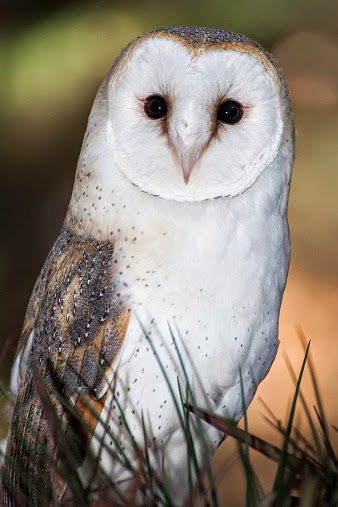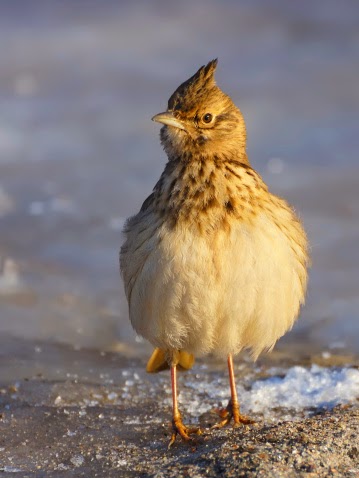Neuroscience
 For many years psychologists have divided people into two types based on their sleeping habits. There are Larks who rise early, feel sprightly in the morning, and retire to bed early; and Owls, who do the opposite, preferring to get up late and who come alive in the evening.
For many years psychologists have divided people into two types based on their sleeping habits. There are Larks who rise early, feel sprightly in the morning, and retire to bed early; and Owls, who do the opposite, preferring to get up late and who come alive in the evening.
Have you ever thought that you don't fit either pattern; that you're neither a morning nor evening person? Even in good health, maybe you feel sluggish most of the time, or conversely, perhaps you feel high energy in the morning and evening. If so, you'll relate to a new study published by Arcady Putilov and his colleagues at the Siberian Branch of the Russian Academy of Sciences.
The researchers invited 130 healthy people (54 men) to a sleep lab and kept them awake for just over 24 hours. The participants were asked to refrain from coffee and alcohol, and several times during their stay they filled out questionnaires about how wakeful or dozy they were feeling. They also answered questions about their sleep patterns and wakeful functioning during the preceding week.
 By analysing the participants' energy levels through the 24 period and their reports about their functioning during the previous week, Putilov and his team identified four distinct groups. Consistent with past research, there were Larks (29 of them), who showed higher energy levels on the first and second mornings at 9AM, but lower levels when tested at 9PM and midnight; and there were Owls (44 of them), who showed the opposite pattern. The Larks also reported rising earlier and going to bed earlier through the previous week, whereas the Owls showed the opposite pattern. There was an average two-hour difference between the sleep and wake cycles of these two groups.
By analysing the participants' energy levels through the 24 period and their reports about their functioning during the previous week, Putilov and his team identified four distinct groups. Consistent with past research, there were Larks (29 of them), who showed higher energy levels on the first and second mornings at 9AM, but lower levels when tested at 9PM and midnight; and there were Owls (44 of them), who showed the opposite pattern. The Larks also reported rising earlier and going to bed earlier through the previous week, whereas the Owls showed the opposite pattern. There was an average two-hour difference between the sleep and wake cycles of these two groups.
The researchers also identified two further chronotypes. There was a "high energetic" group of 25 people who reported feeling relatively sprightly in both the morning and evening; and a "lethargic" group of 32 others, who described feeling relatively dozy in both the morning and evening. Unlike the Owls and Larks, these two groups didn't show differences in terms of their time to bed and time of waking - their habits tended to lie mid-way between the Larks and Owls.
The researchers said their results support the idea of there being "four diurnal types, and each of these types can ... be differentiated from any of three other types on self-scorings of alertness-sleepiness levels in the course of 24-hours sleep deprivation."
We already have bird names for morning and evening people - Owls and Larks. Part of the title of this new paper is "A search for two further 'bird species'". I was hoping the authors might propose two new bird names for their high energy and lethargic categories, but sadly they don't. What about Swift for the high energy category? I'm not sure about a lethargic bird. It's over to you - any ideas? [Readers on Twitter have so far proposed Dodo and Pelican].
_________________________________
Putilov, A., Donskaya, O., & Verevkin, E. (2015). How many diurnal types are there? A search for two further “bird species” Personality and Individual Differences, 72, 12-17 DOI: 10.1016/j.paid.2014.08.003
--further reading--
Owls get poorer school grades than larks
Early risers are more proactive than evening people
Post written by Christian Jarrett (@psych_writer) for the BPS Research Digest.
- Owls Get Poorer School Grades Than Larks
From our enlightened 21st century perches, we frown upon the old practice of forcing left-handers to use their right hands. And yet, today our entire society still functions in a way that is biased against those "owls" whose chronotype means they function...
- You're Most Creative When You're At Your Groggiest
Are you an evening person? Guess what? Early in the day, when you're bleary eyed, stumbling about in the fog of sleepiness, you're probably at your creative peak. In contrast, if you're a morning person, then for you, the evening is the best...
- Early Risers Are More Proactive Than Evening People
I've always envied early risers, those who spring out of bed at the crack of dawn, ready, it seems, to take on the world. Of course their early vitality could be short-lived. Morning friskiness gives the impression of a positive nature but are 'larks'...
- Our Bodies Fail To Adjust To Seasonal Clock Changes
The UK and other countries have been altering their clocks with the seasons since at least the beginning of the last century. The argument in favour of Daylight Saving Time (DST), or British Summer Time as it's called in the UK, is clear: daylight...
- The Personality Of Early Risers
Morning people, early risers. You know the type; you might even be one. They've already done the housework and gone for a jog while the rest of us are still blissfully cocooned in our beds. According to Juan Francisco Diaz-Morales, such people tend...
Neuroscience
You've heard of "Owls" and "Larks", now sleep scientists propose two more chronotypes

Have you ever thought that you don't fit either pattern; that you're neither a morning nor evening person? Even in good health, maybe you feel sluggish most of the time, or conversely, perhaps you feel high energy in the morning and evening. If so, you'll relate to a new study published by Arcady Putilov and his colleagues at the Siberian Branch of the Russian Academy of Sciences.
The researchers invited 130 healthy people (54 men) to a sleep lab and kept them awake for just over 24 hours. The participants were asked to refrain from coffee and alcohol, and several times during their stay they filled out questionnaires about how wakeful or dozy they were feeling. They also answered questions about their sleep patterns and wakeful functioning during the preceding week.

The researchers also identified two further chronotypes. There was a "high energetic" group of 25 people who reported feeling relatively sprightly in both the morning and evening; and a "lethargic" group of 32 others, who described feeling relatively dozy in both the morning and evening. Unlike the Owls and Larks, these two groups didn't show differences in terms of their time to bed and time of waking - their habits tended to lie mid-way between the Larks and Owls.
The researchers said their results support the idea of there being "four diurnal types, and each of these types can ... be differentiated from any of three other types on self-scorings of alertness-sleepiness levels in the course of 24-hours sleep deprivation."
We already have bird names for morning and evening people - Owls and Larks. Part of the title of this new paper is "A search for two further 'bird species'". I was hoping the authors might propose two new bird names for their high energy and lethargic categories, but sadly they don't. What about Swift for the high energy category? I'm not sure about a lethargic bird. It's over to you - any ideas? [Readers on Twitter have so far proposed Dodo and Pelican].
_________________________________

Putilov, A., Donskaya, O., & Verevkin, E. (2015). How many diurnal types are there? A search for two further “bird species” Personality and Individual Differences, 72, 12-17 DOI: 10.1016/j.paid.2014.08.003
--further reading--
Owls get poorer school grades than larks
Early risers are more proactive than evening people
Post written by Christian Jarrett (@psych_writer) for the BPS Research Digest.
- Owls Get Poorer School Grades Than Larks
From our enlightened 21st century perches, we frown upon the old practice of forcing left-handers to use their right hands. And yet, today our entire society still functions in a way that is biased against those "owls" whose chronotype means they function...
- You're Most Creative When You're At Your Groggiest
Are you an evening person? Guess what? Early in the day, when you're bleary eyed, stumbling about in the fog of sleepiness, you're probably at your creative peak. In contrast, if you're a morning person, then for you, the evening is the best...
- Early Risers Are More Proactive Than Evening People
I've always envied early risers, those who spring out of bed at the crack of dawn, ready, it seems, to take on the world. Of course their early vitality could be short-lived. Morning friskiness gives the impression of a positive nature but are 'larks'...
- Our Bodies Fail To Adjust To Seasonal Clock Changes
The UK and other countries have been altering their clocks with the seasons since at least the beginning of the last century. The argument in favour of Daylight Saving Time (DST), or British Summer Time as it's called in the UK, is clear: daylight...
- The Personality Of Early Risers
Morning people, early risers. You know the type; you might even be one. They've already done the housework and gone for a jog while the rest of us are still blissfully cocooned in our beds. According to Juan Francisco Diaz-Morales, such people tend...
